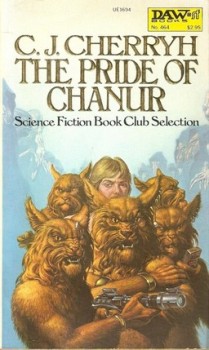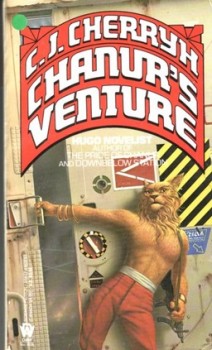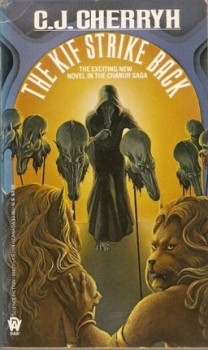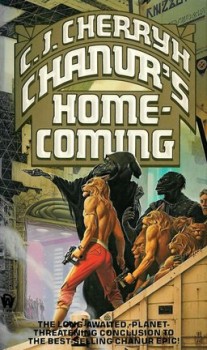The Pride of Chanur by C.J. Cherryh
 My first encounter with C.J. Cherryh was in Merchanter’s Luck, a short, action-packed story set in Cherryh’s super-dense Alliance-Union Universe. While the plot could have been drafted by any number of skilled space opera purveyors, I’d never before encountered one who wrote with Cherryh’s level of near contempt for explaining things to the reader. She writes in what she’s variably called “very tight limited third person” and “intense internal voice.” This means characters only think or talk about what actually interests them. Descriptions will not be forthcoming when a character is observing what is commonplace to him. Exposition, well, don’t count on her books having much.
My first encounter with C.J. Cherryh was in Merchanter’s Luck, a short, action-packed story set in Cherryh’s super-dense Alliance-Union Universe. While the plot could have been drafted by any number of skilled space opera purveyors, I’d never before encountered one who wrote with Cherryh’s level of near contempt for explaining things to the reader. She writes in what she’s variably called “very tight limited third person” and “intense internal voice.” This means characters only think or talk about what actually interests them. Descriptions will not be forthcoming when a character is observing what is commonplace to him. Exposition, well, don’t count on her books having much.
While Merchanter’s Luck, with its thrilling races through hyperspace and deadly mysteries, is quite good, what made me a lifelong fan of Cherryh is a slim volume from 1982, The Pride of Chanur. The title refers to the merchant ship of the same name, one of several operated by the Chanur clan. The Chanur are hani: an alien, leonine race of which only females travel into space, the males being considered too violent and psychologically unstable. The title takes on a second, humorous meaning when the crew of the Pride find themselves harboring and protecting a lone human male.
Since then, I’ve read Pride and its sequels three or four times. They are among the very best space opera stories I have ever read. Cherryh’s writing demands you keep up and are as willing as her heroes to leap into the dark of the cosmos at times. The payoff is a tale of incredible thrills in a highly complex and believably detailed universe.
 The hani are one of seven alien races — four oxygen breathing, three methane breathing — who form the Compact. Not a government, it is a treaty zone that regulates interstellar free trade between the races. In addition to the hani, there are the wily, simian mahendo’sat, the predatory kif, and the tri-gendered, personality-shifting stsho. There are also the methane-breathing knnn, t’ca, and chi. Of those three, only the t’ca can communicate with the oxygen-breathers and then, at best, with great difficulty. For years they have managed to trade in relative peace, but something that threatens old power balances comes along:
The hani are one of seven alien races — four oxygen breathing, three methane breathing — who form the Compact. Not a government, it is a treaty zone that regulates interstellar free trade between the races. In addition to the hani, there are the wily, simian mahendo’sat, the predatory kif, and the tri-gendered, personality-shifting stsho. There are also the methane-breathing knnn, t’ca, and chi. Of those three, only the t’ca can communicate with the oxygen-breathers and then, at best, with great difficulty. For years they have managed to trade in relative peace, but something that threatens old power balances comes along:
There had been something loose about the station dock all morning, skulking in amongst the gantries and the lines and the canisters which were waiting to be moved, lurking wherever shadows fell among the rampway accesses of the many ships at dock at Meetpoint. It was pale, naked, starved-looking in what fleeting glimpse anyone on The Pride of Chanur had had of it.
When the fugitive creature, naked save a few dirty rags, attempts to sneak aboard The Pride, its captain, Pyanfar Chanur, wounds him in her attempt to stop him. Sensing he is no dumb beast, she and her crew secure him on their ship and patch his wounds. They learn he is called Tully and is human. He is the sole survivor of an exploration ship captured by the kif. When a kif potentate, Akukkakk, discovers the hani crew have Tully, he threatens to kill them if the human is not returned. With that ultimatum begins a dash from system to system in hopes of escape. Pyanfar, her crew, and the fugitive become enmeshed deeper and deeper in a situation only partly of their making.
 The bones of The Pride of Chanur are pure space opera adventure — mysterious and dangerous aliens and spaceships, guns blazing, streaking through space. Pyanfar (whom I’ve previously called out as one of my favorite sci-fi heroes) is a tough, no-nonsense space captain who knows how to balance perfectly between calculation and swagger.
The bones of The Pride of Chanur are pure space opera adventure — mysterious and dangerous aliens and spaceships, guns blazing, streaking through space. Pyanfar (whom I’ve previously called out as one of my favorite sci-fi heroes) is a tough, no-nonsense space captain who knows how to balance perfectly between calculation and swagger.
The main antagonist — the kif prince, or hakkikt — Akukkakk is the stuff of pure pulp villainy. He could have stepped straight out the darkest recesses of the cantina on Tatooine:
“Huh.” Pyanfar turned again and looked toward the shadow.
There. By the canisters after all. A kif stood there, tall and black-robed, with a long prominent snout and hunched stature. Pyanfar stared at it directly — waved to it with energetic and sarcastic camaraderie as she started toward it.
It stepped back at once into the shelter of the canisters and the shadows. Pyanfar drew a great breath, flexed her claws and kept walking, round the curve of the canister stacks and softly — face to face with the towering kif. The kif looked down on her with its red-rimmed dark eyes and long-nosed face and its dusty black robes like the robes of all other kif, of one tone with the gray skin…a bit of shadow come to life.
Like the related Alliance-Union series, the Chanur setting is gritty and dangerous. Aside from hyperspace travel, itself a fairly grueling undertaking that leaves the hani shedding and exhausted, the rest of the gadgetry is low-tech. Gravity on ships and stations is maintained by rotation for centrifugal force. People travel through space to make money, not explore the wonders of the galaxy. Think Firefly, definitely not Star Trek, when approaching this book.
The story moves with mind-blowing momentum, jerking the reader back and forth as brutally as it does Pyanfar and company. One moment you’re blowing the grapples of Meetpoint Station with a kif hunter ship gunning for you, the next you’re lurking in the dark of an asteroid belt, then making a break for the safety of distant stars with the kif hot on your tail again. All the while, hani rivals are skulking in the background plotting their own schemes against you, and who really knows what the mahendo’sat are up to. As space opera, The Pride of Chanur provides ample entertainment and excitement. It’s what sci-fi adventure should aspire to.
The blood and sinews of Pride are something else. Across her career, Cherryh has excelled at creating beings who are not rubber-forehead aliens or from the planet of hats. Her aliens think, act, and contemplate the universe in very different ways than each other. Even when broad traits exist across a single species, different factions and nations within them operate from their own motives and individual beliefs. What lies at the heart of the Chanur stories is the exploration of how beings who have little-to-nothing in common regarding their basic perceptions of the world might communicate and even cooperate.
While the kif remain Pyanfar’s primary danger through the course of Pride, still she struggles to fully understand them. Their society is built on sfik, a combination of prestige, power, and fear. The more sfik a kif accumulates, the more power it has. The threat of loss of sfik may drive it to actions that are unthinkable for other species:
Strike at Anuurn itself — Akukkakk could not be so rash. He had not that many ships, that he could do such a thing. It was bluster, of the sort the kif always used, hyperbole…of the sort they always flung out, hoping for more gains from an enemy’s panic than force could win. Unless the hakkikt was mad…a definition which, between species, lacked precision. Unless the hakkikt commanded followers more interested in damage than gain.
 Seeking to understand the methane-breathers actions is even more complicated. Knnn trade by dumping what they have on a station and then snatching what they want in return, which is better than what they used to do: simply rip ships open in deep space and take everything. As for the t’ca, they can speak to the oxygen-breathers, but only in a complex seven by five matrix that can be read in multiple, simultaneous ways.
Seeking to understand the methane-breathers actions is even more complicated. Knnn trade by dumping what they have on a station and then snatching what they want in return, which is better than what they used to do: simply rip ships open in deep space and take everything. As for the t’ca, they can speak to the oxygen-breathers, but only in a complex seven by five matrix that can be read in multiple, simultaneous ways.
When Akukkakk’s actions threaten the survival of the Compact, along with the hani homeworld, Pyanfar and her crew are the only hani ready to stop him. But she must reach out to other species, putting her at risk of being seen as a traitor by her fellow hani. That she does this without ever violating her code of honor attests to her strengths, but it still involves putting her ship, her crew, and her clan in grave danger. She must learn new ways of thinking and explaining to the hani that a threat to the Compact is also a threat to them, something the planetbound majority are unwilling to believe or understand.
Reading Pride for the first time in about a dozen years, I was impressed by how well it holds up. I’ve read a few online reviews that have called it out for being dated, but I just don’t see it. As an action tale, it remains terrific fun, and as a study of communication between disparate beings, it is unimpeachable. I will be rereading the rest of the sequence this year.
The Pride of Chanur is a book that can be read in one or two sittings. Into that 224 pages, though, Cherryh has crammed more characters and universe-building than seems possible. It also serves as a perfect introduction to the huge catalogue (nearly seventy novels and counting) of one of the best sci-fi writers. Complicated as it is, it’s an easier go than Hugo-winners Downbelow Station and Cyteen. She is a master of space opera that’s both deeply intelligent and edge-of-the-seat exciting.
Perhaps the best thing about The Pride of Chanur is that it is serves as the foreword to the trilogy that follows it. Well, really, the single big book that 1980s marketing required be broken up into three books. Set a few years after Pride’s conclusion, Chanur’s Venture, The Kif Strike Back, and Chanur’s Homecoming, ratchet up the complications and danger of Pride by an order of magnitude.
Note: I haven’t kept up with Cherryh’s seventeen-book-long Foreigner sequence. It’s dominated her writing for nearly the past twenty-five years. Its focus is on the struggle of a lost group of human space colonists to communicate with the natives of the planet they land on.
Fletcher Vredenburgh reviews here at Black Gate most Tuesday mornings and at his own site, Stuff I Like when his muse hits him. Right now, he’s writing about Western movies.
I _think_ this was my first Cherryh — I remember finding it in the public library after reading a glowing review in Dragon Magazine (Dragon #58, Feb. ’82). This would’ve led me to Downbelow Station, Merchanter’s Luck and the Morgaine books, and turned me into a lifelong fan of hers (although I confess that I also haven’t dipped into the Foreigner books). I _really_ need to revisit these soon, especially now that they’re on my Kindle.
Hard as it is to admit, I’ve never read any CJ Cherryh. I know… inexcusable.
I think the reason is that she’s published virtually no short fiction… and that was how I discovered all my favorite writers in the formative days of my youth. It was anthologies and magazines that led me to Isaac Asimov, Roger Zelazny, Ursula K. Le Guin, Clifford D. Simak, and dozens more.
Four decades later, I’m forced to admit this strategy has some holes in it. This is a terrific post Fletcher, and it’s definitely sharpened my appetite to try Cherryh sooner rather than later. My thanks!
There are several excellent collections of Cherryh’s short fiction.
http://www.isfdb.org/cgi-bin/ea.cgi?16
So, not much excuse.
Cherryh was and remains one of the best writers in SFF.
Yeah, aside from shared-world stuff (Thieves’ World, Heroes in Hell, etc.), she’s published just enough short fiction for one good-sized collection — The Collected Short Fiction of C.J. Cherryh, which included her entire 1986 collection Visible Light (including her interstitial notes), her short novel/collection Sunfall, and a few additional previously-uncollected stories.
Interestingly, she had a story (A Thief in Korianth) in Lin Carter’s Flashing Swords #5. It’s one of my favorites of hers — written with a much lighter touch than some of her other works.
If you want a novel-length place to dive in, I’d lean towards Pride of Chanur, Merchanter’s Luck or Gate of Ivrel (the first Morgaine book).
Top notch review, Fletcher.
It’s so good it made me feel an odd sort of sorrow at how long it’s been since I read any Cherryh.
Very nice review, it has surely wet my appetite to track down Pride and read it.
I did a pretty extensive CJC reread last year. Felt good! Unfortunately, I lost a lot of my Cherryh books in the Flood in 2012, including my hardcovers of the first five Foreigner novels.
I still have about 10 CJC novels I haven’t read.
[…] (Black Gate) The Pride of Chanur by C.J. Cherryh — “Across her career, Cherryh has excelled at creating beings who are not […]